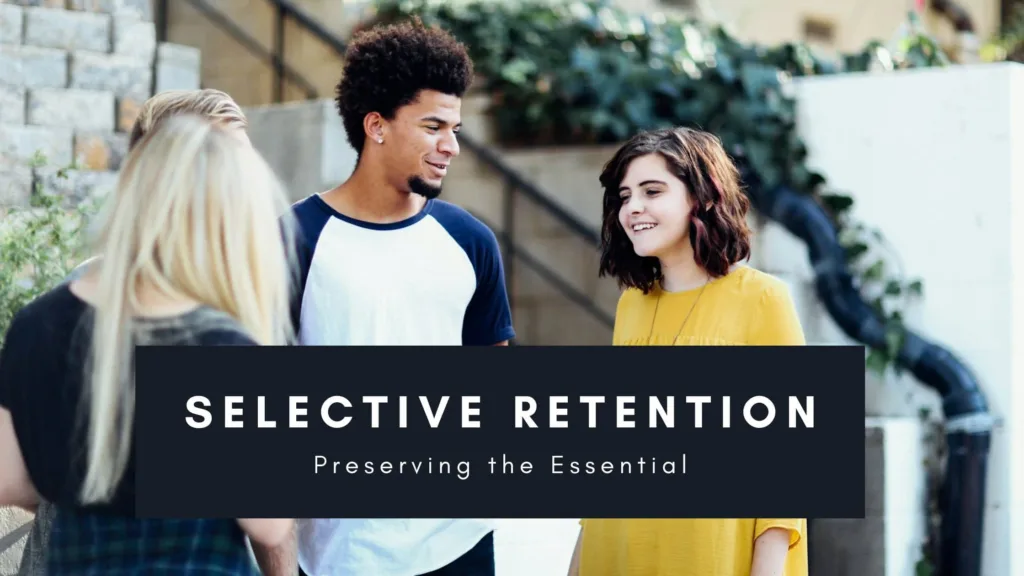Every day, our brains deal with a lot of information. But they have a cool trick called Selective Retention. It helps us figure out what’s important, understand it well, and remember it. Knowing about this can teach us a lot about how our minds function and why we behave the way we do.
What is Selective Retention?
Selective Retention is like having a special filter in our brains. It helps us remember things that we already like or believe while ignoring things that don’t fit with what we think. For example, if you really enjoy basketball and watch a game, you’ll probably remember the awesome plays made by your favorite team and players. But you might forget or not notice the times when they didn’t play so well. That’s because your brain focuses on the stuff that supports your love for basketball and kind of ignores the rest. So, Selective Retention affects what we pay attention to, how we understand things, and which memories stay in our minds.
Factors Influencing Selective Retention
Here are the things that make our brains remember some stuff and forget others:
- What We Like: We remember things that match what we already know or enjoy. For example, if you love animals, you’ll remember more about your favorite pets.
- Feelings: Things that make us feel strong emotions stick in our memory. Like remembering a fun day at the beach or a sad movie.
- Repeating Stuff: The more we hear or see something, the better we remember it. It’s like learning the lyrics to a song after hearing it a lot.
- Important Things: We remember stuff that’s useful or important to us. For instance, if you need to remember your friend’s birthday, you’re more likely to keep it in mind.
- Our Goals and Beliefs: Our brains like to hold onto information that fits what we already think or want. This can make us forget things that don’t match our beliefs.

Consequences
Here’s how Selective Retention affects our lives in simple terms:
- Beliefs and Opinions: It makes us remember things that support what we already think or believe. For example, if you like a certain type of music, you’ll remember the good things about it and forget the bad.
- Decision Making: It influences the decisions we make by making us focus on information that agrees with our choices and ignore other facts. This can sometimes lead us to make choices that might not be the best.
- Relationships: It affects how we remember our interactions with others. For instance, if you like someone, you’ll remember the nice things they did and forget when they were not so nice.
- Media: It shapes how we consume media by making us look for information that agrees with what we already think. This can make us miss out on different viewpoints.
- Learning: It impacts how we learn and remember new things by making us remember what’s important to us. But it can also limit our understanding if we only focus on what we already know.
Related Article: Selective Attention: Filtering the Noise
Overcoming Selective Retention
We can try a few things to beat Selective Retention:
- Listen to Different Ideas: We can make an effort to hear what other people think, even if we don’t agree. This helps us understand more about the world and stops us from only focusing on what we already believe.
- Question What We Think: It’s good to ask ourselves why we believe certain things. We can wonder if there are other ideas out there that might also make sense.
- Stay Open to New Ideas: Keeping an open mind means we’re ready to learn new things, even if they don’t match what we already know. This helps us fight against Selective Retention.
- Look for Different Info: Actively searching for information that doesn’t agree with what we think can help balance things out. It means we’re open to hearing different sides of a story.
- Think Carefully: Developing our thinking skills helps us look at information in a fair way. We learn to check where info comes from and think about different points of view.
- Know Our Biases: Understanding our own biases is the first step to beating them. When we realize Selective Retention is affecting us, we can try to change it.
Question What We Think We Know: It’s good to check if what we think is always right. Being open to changing our minds helps us grow and learn more about the world.
So, Selective Retention is a big part of how our brains work. It decides what we pay attention to, how we understand things, and what we remember. But if we learn about how it works and try to fight against its biases, we can get better at understanding the world around us.

Pingback: Selective Forgetting: Redefining Memory Management
Pingback: Serial Recall: Piecing Together the Puzzle of Memory